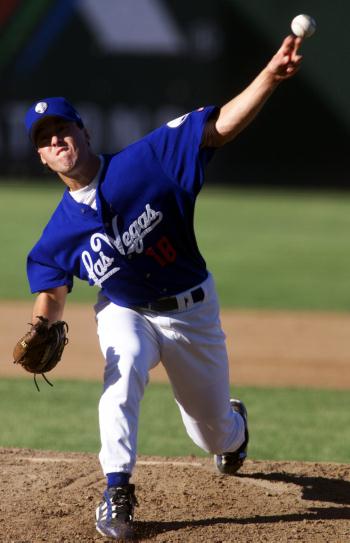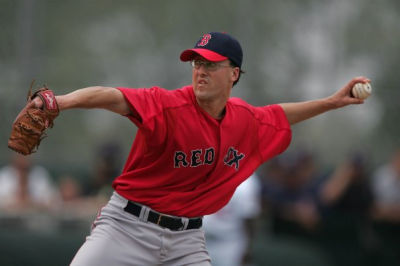Where are they now? Phil Devey is selling houses in Lafayette La.
Phil Devey (left) with his wife, Heather, and their children (from right), Baylin, Jackson and Olivia.
LHP Phil Devey (Lachute, Que.) played seven seasons in the minors for the class-A Yakima Bears, class-A San Bernardino Stampede, class-A Vero Beach Dodgers, double-A Jacksonville Suns and triple-A Las Vegas 51s in the Los Angeles Dodgers system. Then, he moved on to the double-A Chattanooga Lookouts (Cincinnati Reds), double-A Portland (Boston Red Sox), San Antonio Missions (Texas Rangers) and double-A Reading Phillies (Philadelphia). He pitched independent league ball for the Long Island Ducks, Pensacola Pelicans.
In all, Devey was 35-42 with a 4.25 ERA in 194 games making 102 starts. He walked 228 and struck out 501 in 723 2/3 innings. He also pitched for Team Canada.
How I Got Here with former UL pitcher Phil Devey: ‘At the end of the day...supply and demand rules all’
Phil Devey is owner of Frontline Real Estate Group. A native of Canada and a former pitcher at the University of Louisiana at Lafayette, his company owns several residential and commercial properties in Lafayette. (CBN Editor’s Note: The following is how Devey describes his career odyssey in his own words)
I am from a small French Canadian town called Lachute, Que.. It is roughly one hour northwest of Montreal at the base of the Laurentian Mountains. My parents were high school teachers, and I have an older brother, younger brother and younger sister, all of whom still live in Canada. I grew up speaking both English and French and playing mostly hockey and baseball a few months in the summer.
My mom is a French teacher in Quebec and came to Lafayette for a teacher’s conference. At the time I had applied and was accepted to go to McGill University in Montreal, but I always had a dream to play ball in the United States at a Division I school. My mom met a teacher from Crowley who introduced her to UL Coach (Tony) Robichaux, and she came home with his business card. I called him every day for two weeks until he finally got tired of me calling and told me if I can find a way to get down to Louisiana he would let me try out. Next thing you know he’s bringing me in with the bases loaded and one out in the fifth inning at Alex Box Stadium to face two All-Americans and 10,000 screaming fans. Got my first college win that day, and the rest is history.
Minor league baseball life is very well depicted in movies like Bull Durham and The Rookie. I enjoyed the process early, but after several years the grind wore me down. I realize now my enjoyment and passion for the game diminished quickly over time. I know now I performed my best under the guidance and support of Coach Robichaux and my teammates at UL. I pitched and wanted to perform for them. They were my inspiration. In the minor leagues it’s very much about performing for yourself and hoping to pass up your teammates to get to the big leagues.
The last few years in I started reading more business-related books on bus and plane trips. I read a book called “Rich Dad, Poor Dad” by Robert Kiyosaki that changed my perspective and got me interested in real estate. In 2006, when my baseball career ended, I moved back to Lafayette with no money to invest but a desire to flip houses. I started tracking pre-foreclosures and coming up with solutions to help homeowners and banks by negotiating what is referred to as short sales. I had a banker named Wayne Bares, who is now one of my biggest mentors, take a chance on me early in my real estate career and, like in baseball, the rest is history.
In my experience from our rental portfolio and discussions with my property managers and other multi-family property owners in our market, we have not noticed a trend of longer tenant retention. I think larger markets could be experiencing an affordability issue for home ownership along with more stringent lending processes. That could be one of several reasons tenants are staying longer in their rental units. In larger populations on a national level, that could be skewing the numbers. Locally I think the turnover rates have been generally stable.
I think national numbers are not representative of what’s happening in our market. I don’t have the data to back it up, but inventory is much higher in the rental market. The laws of macroeconomics always apply. When supply is up and demand is down, prices go down. To experience an increase in pricing, we would need a reduction in supply and/or an increase in demand. I have not seen either of these scenarios play out.
I am eager to see what happens with the new apartment construction. The Opportunity Zone incentives have been the catalyst for a few of these projects, demographics that show a need for more student housing for others and the availability of attractive terms on non-recourse financing for conventional multi-family new construction. At the end of the day, no matter the reason for the investment, supply and demand rules all. There’s a careful dance of musical chairs. You don’t want to be the one that built a complex when everyone has found a seat. It is also such a long process to build that markets can change from the time you bought the land to completion. It should be a methodical process that is extremely well-planned out.




